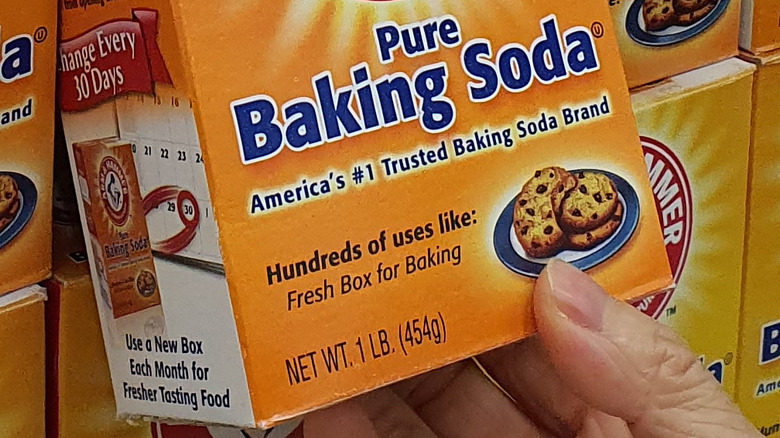People With Kidney And Liver Issues Should Avoid This Viral Health Hack
There's no shortage of content for health-conscious folks on social media, regardless of whether or not said content is truthful and evidence-based. One particular health hack that's presently making the rounds involves mixing some baking soda (sodium bicarbonate) into water and, well, drinking it. Content creators who push for the consumption of this colorless concoction assert that it can help people lose weight, perform intense physical activities better, improve their gut health, and even cut their cancer risk.
But before you start ingesting this supposedly wonderful drink for all your health woes, it's worth asking if evidence supports it. Moreover, for people without proper medical knowledge or training, it is very easy to go overboard on self-medication or home remedies, which can have serious consequences — especially for people with liver or kidney problems.
Speaking to Health Digest, Dr. Amy Lee warns that ingesting too much concentrated baking soda can cause irritation, as it can be too alkaline. "Prolonged use can cause what we call metabolic alkalosis, which can be dangerous," explains Lee, the Head of Nutrition for Nuficic.
How drinking baking soda could be bad for you
Alkalosis is the state in which your body has an acid-base (alkali) imbalance (via the Cleveland Clinic). Maintaining the body's alkali balance is key to ensuring that your bodily systems are running properly. Metabolic alkalosis occurs when your bodily fluids have too much bicarbonate, or when changes in the body (e.g., reduced stomach acid levels) disrupt its alkali balance. Having kidney- or liver-related issues can be a factor in developing this condition, which can severely affect the way your organs function if it is allowed to worsen. According to Dr. Amy Lee, the pH level of baking soda is 8 to 9, which means that while ingesting it can counteract excess acid in your stomach, too much of it can be detrimental to your health. Some of the related health issues that Lee mentions are cardiac arrest, diarrhea, seizures, and vomiting.
Prolonged unsupervised consumption of baking soda can also increase a person's risk of sodium-mediated fluid retention (which can lead to heart health issues and weight gain) and hypernatremia (abnormally high sodium levels in the blood), particularly if they have kidney disease (via a 2021 meta-analysis in Therapeutics and Clinical Risk Management). Additionally, there are approximately 1,200 milligrams of sodium in a teaspoon of baking soda, per the U.S. Department of Agriculture. In other words, drinking water with baking soda already accounts for more than half of the recommended daily limit for sodium consumption in the United States (2,300 milligrams).
Other issues related to drinking water with baking soda
With that said, the idea of ingesting baking soda for better health isn't exactly groundless. In fact, you'll find sodium bicarbonate listed among the ingredients of commercially available oral (e.g., toothpaste) and ear care products. "I would say that routine use (as a rinse) shouldn't be an issue," says Dr. Amy Lee.
Other issues related to consuming sodium bicarbonate in excessive amounts include possible gas accumulation and rupturing of the stomach, potential toxicity (especially in children), and disrupted absorption of medications. For these reasons, it is highly recommended that before you decide to make water mixed with baking soda a regular part of your diet, you consult a healthcare professional first, especially if you have liver or kidney issues.
And if you or a loved one is suffering from adverse effects following sodium bicarbonate consumption, seek medical attention immediately or call Poison Control at 1-800-222-1222 (via WebMD).


